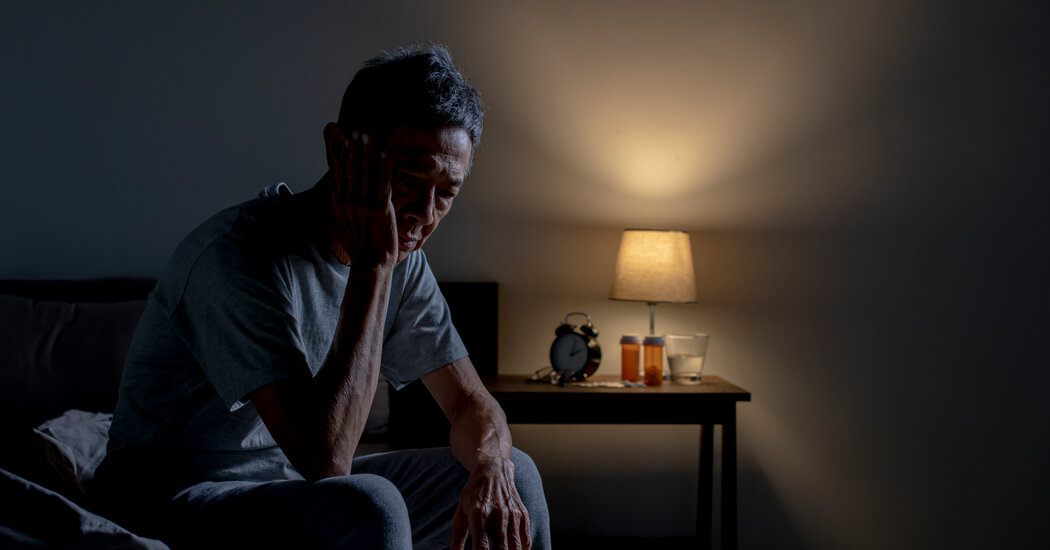Infection
Covid Can Disrupt Your Sleep
Here’s why, and how to find some relief.
At this point, many of us recognize the hallmark symptoms of a Covid infection: an aching throat, a clogged nose, a persistent cough and an overwhelming sense of blah. But lying awake at night, during the peak of sickness or in the weeks or months following an infection, some people discover another downside: They can’t sleep.
“We see it all the time,” said Dr. Ziyad Al-Aly, the chief of research and development at the V.A. St. Louis Healthcare System. Here’s why Covid can be so disruptive to your sleep, along with tips for getting enough rest.
Why Covid affects sleep
One theory is based in biology: In some people with Covid infections, the virus may be able to get into the hypothalamus — a key part of the brain for regulating sleep, said Dr. Peter Chin-Hong, an infectious disease specialist at the University of California, San Francisco. Any area of the body that the virus enters, it can inflame, he said; any part that gets inflamed tends to function less well.
This means that even if people linger in bed for eight hours, they may not be getting deep, restorative sleep, Dr. Al-Aly said.
The psychological strain that comes with having Covid can also disrupt sleep, Dr. Chin-Hong said. People can feel anxious in isolation, which can leave them restless and unable to sleep soundly.
And then there are the physical effects of the sickness: The symptoms can keep you up.
Conversely, some people end up sleeping for long stretches when they have Covid, Dr. Al-Aly said, as the body conserves energy while it fights off the infection. “The whole circadian rhythm, the whole equilibrium of the body,” he said, “is really disturbed in the acute phase.”
Sleep disruptions can continue even after the virus has run its course and someone has tested negative. A study of over 950 adults with long Covid found that 41 percent of them experienced moderate to severe sleep disturbances. In addition to things like restlessness and insomnia, Dr. Al-Aly said that some people with long Covid may continue to sleep for extended periods of time because the body still acts as though it needs to fight off the virus.
Persistent sleep issues may potentially stem from lingering inflammation in the brain, as well as the aches and pains that can come with long Covid. They may also be a byproduct of anxiety and depression that can strike some people in the wake of an infection, Dr. Chin-Hong said.
There’s also a possible association between long Covid and respiratory conditions like obstructive sleep apnea, said Dr. Marc Sala, co-director of the Northwestern Medicine Comprehensive Covid-19 Center in Chicago.
Poor sleep could be one possible explanation for why so many people with long Covid experience intense fatigue, Dr. Al-Aly said.
What to do about Covid-related sleep disturbances
The basic rules of good sleep hygiene apply to people who have Covid or are in the aftermath of the infection, Dr. Chin-Hong said. Make sure your room is dark and cool and avoid drinking alcohol too close to bedtime, he advised. If you find yourself tossing and turning in bed, don’t just stay there: Move to a different part of the room (or another room altogether) and spend 15 minutes doing a soothing, ideally screen-free activity, like knitting, reading or listening to a podcast or calming music. If you are too exhausted to move, even sitting up in bed can be helpful.
Cognitive behavioral therapy may also be a useful tool to get more and better sleep, said Dr. Paul Auwaerter, a professor at the Johns Hopkins University School of Medicine. Therapists and other clinicians can administer cognitive behavioral therapy, and there are online tools like Insomnia Coach, a free app from the Department of Veterans Affairs that anyone can use.
Dr. Auwaerter said he sometimes recommends certain medications, like low doses of antidepressants, to help alleviate persistent sleep issues.
If you are consistently struggling to get enough sleep during or after Covid, talk to your health care provider; they may want to screen for sleep apnea, Dr. Sala said.
Restless nights are a pain for anyone, but they can be particularly damaging for people struggling with long Covid, Dr. Sala said. “A bad night’s sleep can be really troublesome the next day for you in terms of your energy, your thinking,” he said, “but this seems to be even more dramatic for someone who already has brain fog.”

